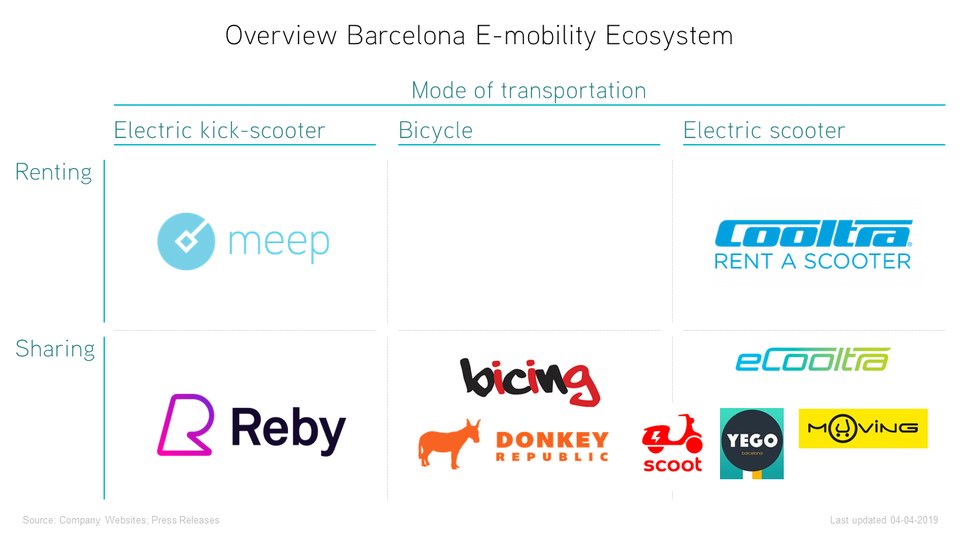E-mobility is the future. And Barcelona is one of the most advanced cities in terms of e-mobility worldwide. Many local players offer a wide range of products from electricity-powered bicycles to kick-scooters and scooters, via both sharing and rental schemes. Here’s a deep-dive into the growing mobility ecosystem in Barcelona!
Barcelona’s E-mobility Options: A Guide
Barcelona is one of the most impressive cities to live and work in. For those of us who have to commute on a daily basis, there are a variety of options out there to choose from. All these options are comfortable, affordable and accessible and most of all electric. That means they don’t come with noise and air pollution, so by choosing one of these solutions rather than car or bus you’re doing your bit for the planet too. Struggling to choose from such an array of e-mobility transport options? Here’s a breakdown.
The e-mobility ecosystem can essentially be categorized into two dimensions, mode of transport (kick-scooter, scooter and bicycle) and type of access (buying, renting or sharing). In this article, we’ll focus on the novel modes of e-mobility rather than looking at existing commuting options such as public transport.

The rise of the electric kick-scooter
Barcelona is probably the most advanced when it comes to using electric kick-scooters. By 2017 already, many individuals were owning these modes of transportation and a variety of different retailers popped up around the city such as (SoloRueda and ePTV), which distribute a variety of brands ranging from Joyor to Segway and spanning many different price points. Beyond ownership however, there are now more innovative ways to get access to these types of transport.
Reby
In 2018, electric kick-scooter sharing startups started to pop up around the globe with startups Bird and Lime gaining the majority share of publicity and funding. However, Reby is for now the main player operating in Barcelona. The system works on demand and users can easily unlock available scooters (which can be found around the city) via an app. The initial unlock costs 1 EUR with every minute of use costing the user 0.15 EUR per minute. While the system provides a lot of flexibility, scooters are not always available, and costs can ramp up quickly.
GOMEEP
Another example of an innovative electric kick-scooter proposition is the business model of GOMEEP (previously known as MEEP). Founded by three IESE MBAs, GOMEEP offers a monthly rental option for electric kick-scooters at a price of 39 EUR per month. After sign-up, a GOMEEP agent delivers a ready-to-go scooter with a lock to their home within 48 hours. GOMEEP gives users the peace of mind that whenever the vehicle breaks down, the team will come and fix it. Also, the service can be canceled at any time. In the future, the team expects to include additional insurance for users via their website. For just 39 EUR a month, this could be the best option for your daily office commute.
The bicycle market
Barcelona, with its proximity to the sea, is perfect for zipping around by bike. You can even gain access to one without buying (theft can be a problem, so many people prefer not to own their bike). After OFO and mobike from China advanced the sharing model across the globe (with somewhat limited success), Barcelona offers its own docked bicycle sharing option called Bicing. In addition, there are other players such as Donkey Republic that give you access to bicycles with non-docked options that are distributed over the city.
Bicing offered by the local ayuntamiento is an easy-to-access docked bicycle sharing service (the bikes can only be found at Bicing docking stations). With Bicing, the user has to sign up to an annual membership of 35 EUR or 50 EUR and then is charged on a per-use basis. For the electric bicycles on offer the user then pays 0.35 EUR or 0.55 EUR for the first half an hour of use. Since most trips are below this time, Bicing is a great budget option, however Bicing can lack availability (given the location restraint) and maintenance (some of the mechanic bikes are in worse repair).
Donkey Republic
Donkey Republic is a local Barcelona based bike sharing scheme, that works without docks (you essentially can pick them up anywhere around town, depending on availability). To use the bikes, you need to download the app, register and then you can unlock available bikes and you pay per use. The price depends on the time you use it and it decreases with time (e.g., less than 15 minutes costs 1.5 EUR and less than 2 hours will cost you 5 EUR in total). A great option given availability that’s pretty attractive if you’re looking for a bike for a sunny day trip!
The electric scooter market
The electric scooter market is arguably the most active e-mobility market in Spain with some large scale-ups already operating in the market. The concept works like that of dockless bike sharing with parked scooters around the city, that can be reserved and then unlocked through the companies’ apps. Scooters are always available with helmets and thus allow you to even take a second passenger. However, sign-up can take a couple of days since the company needs to check for a valid driving license.
eco Oltra & cooltra
eCooltra is probably the biggest dockless scooter sharing player operating in Barcelona, now operating in 6 cities in Europe. To unlock the scooters, you will need to download the eCooltra App, upload your ID and then you can start driving around the city after they verify your account. With a per-minute charge of 0.26 EUR and lower pricing up to a minimum of 0.19 EUR if you pre-buy minutes, eCooltra is optimal for journeys around town, in particular if you share the ride. eCooltra was launched by the provider of cooltra, a monthly scooter rental company, which is one of the best-known players in this field. With a monthly minimum cost of 130 EUR, it’s a good alternative for frequent scooter users, even though you’re locked in for a year.
YEGO is a great alternative to eCooltra. They’re also a homegrown Barcelona based startup, whose scooters can easily be identified by their green color and the Vespa-style design. The startup is by now operating in three cities, two in Spain and one in France. Overall, in terms of sign-up, booking and usage process via the app, the way the service works is very similar to eCooltra. The base price is 0.25 EUR per minute with a reduction to 0.17 EUR per minute.
Out of the scooter startups, Scoot is the most international with locations ranging from Barcelona, San Francisco to Santiago de Chile. Their geographic diversity makes them stand out as a trusted global option. Scoot also operates across bicycles, electric kick-scooters and scooters. In Barcelona they offer both bicycles and scooters, with pricing of 0.15 EUR per minute for e-bikes and 0.28 EUR per minute for motos.
Moving is the last player operating in Barcelona and offers a similar service to the ones mentioned before, though only focused on scooters. Overall, they now operate in 11 cities in Spain. Pricing is at about 0.25 EUR per minute so very similar to the other options mentioned above.
Conclusion
Barcelona’s growing status as a young startup hub will bring great benefits both to its residents, and the environment too. Expectations are rising: both for more convenient ways of getting around, and more environmentally friendly ones too. Thankfully, a number of forward-thinking organizations are rising to these dual challenges. In this guide, we’ve broken down the wide variety of options available to you and the businesses making waves in this sector. And with summer on the horizon, now’s the perfect time to give one a try!
Note: In this article, we’ve tried to be as neutral as possible and tried to include all competitors operating in the market. If you think an important player is missing, please drop a line to the Barcinno team.
If you enjoyed this article, you might also be interested in the following posts:
- Overview of carsharing & VTC companies in Barcelona
- How Blockchain Technology Will Enable Mobility As A Service







Hello Maximillian,
I’d like to offer an emerging technology to be considered for the mobility movement….my Automated Bicycle Parking System (ABPS). It was designed for the combined use in BikeShare and Public Bicycle Parking. The scaleable and modular design allows it to fit into the built up environment of any city. It can park any size or type of bike, including a child’s bike, adult, tandem, cargo and three wheel adaptive bikes for the disabled.
Can we find some time to talk about the ABPS?
Hey,
Thanks for all the information. With moving to Barcelona this makes things easier. Do you know, however, where I can buy those vintage bikes everybody seems to be riding?